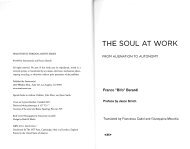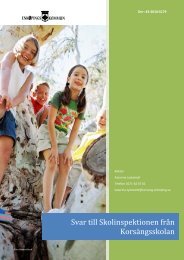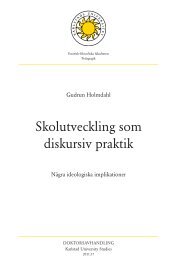FULLTEXT01
FULLTEXT01
FULLTEXT01
Create successful ePaper yourself
Turn your PDF publications into a flip-book with our unique Google optimized e-Paper software.
An educational research and school development project in the 2000s, of thekind I participated in myself, can be seen as an example of both „advancedliberalism‟ and „inclusive liberalism‟, that is to say a kind of control philosophywith connections to both the EU directives and various policy texts by theOECD (Dahlstedt, 2009; Walker, 2009). Perhaps it is also possible to applyCardinis (2009) expression „post-welfare‟ on this sort of liberal governancephilosophy. One can hardly be mistaken of that the active local citizenship, selfregulating,committed, responsible and, in a lifelong perspective, learning citizenis made to an ideal person in the studied practice. That constitutes the image -not only of the useful and respectable citizen - but also the useful andrespectable school developer.School development as a discursive practice is partially produced as a synonymfor a real organization of the environment. Today several professionals withinschools - including its largest group of workers, the teachers - are confrontedwith texts, in which it is assumed that school development is something bothobvious and correct, which has to take place. It is also quite expected that as ateacher one should have a positive attitude to all this. One of the things thathave surprised me in the process of this thesis is the discursively seenwidespread acceptance of and the relatively limited questioning of schooldevelopment as a discursive practice. The acceptance of the unexpected and, inseveral respects ideological implications of this practice, which can be seen asless admirable is also surprisingly. This seems to fit into an attitude, whichaccording to Dahlstedt (2009) characterizes an „advanced liberal‟ welfareregime. Dahlstedt (2009) describes the ideal partnering subject, one that goes into ally itself with the problem formulation in e.g. a partnership, that is to say,one who does not challenge or contest the assumptions or descriptions ofproblems or proposals on their solutions. As Dahlstedt (2009) points out, theideal partnering subject may turn out to be in conflict with the idea of school asthe place of critical and democratic education. Perhaps it is a conflict that evenschool development as discursive practice may prove to contribute. If so, itwould be a somewhat paradoxical ideological implication.Several texts (e.g. policy texts, scientific papers, media scrutiny) associateschools to a kind of deficiency, which means that school never really lives up tothe vision or the image of itself. Therefore, school appears to be an enterpriseconsidered in constant need of intervention and a sort of perpetual revision. Inother words, school development considered as a kind of Sisyphean work.What is somewhat remarkable is also that the proclaimed revisions do not seem185






